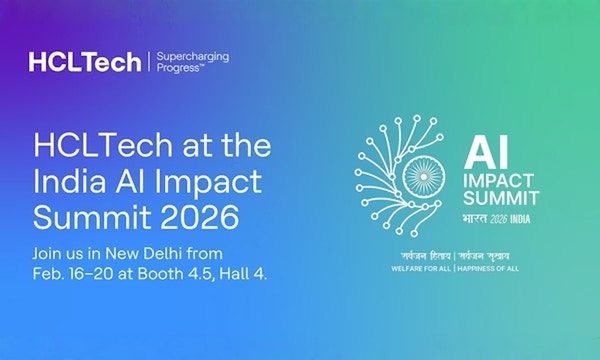Events

HCLTech at India AI Impact Summit
Join HCLTech in New Delhi from 16–20 February 2026 at the India AI Impact Summit to explore sovereign AI, platforms and semiconductor innovation. Click here for details.
Explore more
ViVE 2026
Join us at ViVE 2026 from February 22-25 in Los Angeles. Visit our booth to network with industry peers, learn from leading experts and explore the latest trends in the healthcare industry.
Register now
CyberLive on Securing the data that powers AI
Join this CyberLive session with experts from HCLTech and Microsoftas we crack the code on the AI Trust Advantage.
Register now
GCC 4.0: Co-Creating India’s Innovation Powerhouse
Join GCC 4.0 Summit on Feb 26 in Hyderabad to explore AI-powered Global Capability Centers driving innovation, deep tech scale and business value.
Learn more
MWC 2026 Barcelona - The Great Rebuild
Experience the Great Rebuild at MWC 2026 with HCLTech. Discover how AI-native enterprises are reshaping infrastructure, platforms, and industries. Click here for details.
Register now
HCLTech will be at Fortinet Accelerate 2026
Join HCLTech at Fortinet Accelerate 2026 in Las Vegas. Explore latest cybersecurity solutions for IT-OT security, SD-WAN and cloud protection. Register now!
Register now
HCLTech at SAP A&D Innovation Days 2026
HCLTech at SAP A&D Innovation Days 2026, transforming aerospace and defense with SAP S/4HANA, intelligent service and smart maintenance
Learn more
HIMSS 2026
Join us at HIMSS 2026 from March 9-12 in Las Vegas. Visit our booth to network with industry peers, learn from leading experts and explore the latest trends in the healthcare industry.
Learn moreChip2Intelligence Leadership Series - Infrastructure
Join semiconductor leaders to explore AI-ready infrastructure, hybrid platforms, and AI factory models enabling AI at scale across the semiconductor enterprise.
Learn more
NVIDIA GTC 2026
Join HCLTech at NVIDIA GTC 2026, Mar 16-19 in San Jose, to unlock the full potential of your AI transformation journey with NVIDIA-powered solutions.
Learn more
AI-Powered Customer Experience with HCLTech and Microsoft
This is HCLTech and Microsoft LinkedIn Live on AI for cloud, data and intelligent contact centers featuring Carol Criner and Scott Jansen followed by information regarding In-person event.
Register now
Chip2Intelligence Leadership Series Cybersecurity
As intelligence transforms semiconductor design and fabs, security becomes foundational. This forum brings leaders together to explore what it takes to secure the intelligent enterprise at scale
Reserve your seatPagination

HCLTech at DISTRIBUTECH 2026
Join us at DTECH 2026 for a series of thought-provoking conversations. Visit Booth #3437, San Diego Convention Center, 111 Harbor Dr, San Diego, CA 92101, United States.
Learn more
HCLTech at Davos for World Economic Forum (WEF) 2026
Join us at the 56th Annual Meeting of the World Economic Forum at Davos scheduled from 20th - 22nd January 2026 for insightful perspectives on topics like Agentic AI and other pivotal themes.
Read more
We are at AWS re:Invent 2025
Happening in Las Vegas, from December 1-5. This event promises valuable opportunities for learning, networking and innovation.
Learn more
AIM Webinar with HCLTech: Redefining Engineering Careers in the Age of AI & GenAI
Join us for an insightful webinar, titled ‘Engineering the Future: How AI/GenAI is Redefining Careers,’ when HCLTech leaders will explore the future of engineering, the critical role of responsible in
Register now
Enhancing SAP with Microsoft Power Platform and Copilot
Register now for our webinar: From complexity to simplicity - enhancing SAP with Microsoft Power Platform and Copilot
Register now
Implement Clean Core using SAP BTP for business transformation
Discover how HCLTech can help you keep your SAP S/4HANA environment lean and agile with SAP Business Technology Platform (SAP BTP).
Learn more